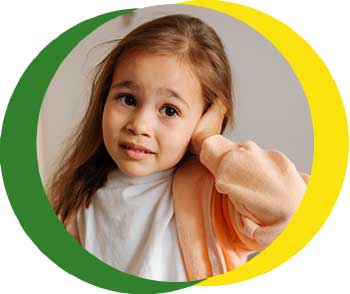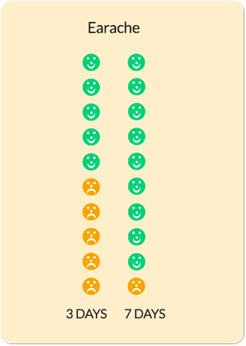Earache

Earache occurs commonly in children and is often associated with a high temperature. They are usually caused by a viral infection – if this is the case, your child may also have a runny nose, cough or sore throat.
- If a number of people are unwell in the same household, this also suggests a viral infection (because viral infections are easily spread)
- Viral infections tend to get better on their own and do not need treatment with antibiotics. Antibiotics may actually cause side effects such as rash and diarrhoea and can increase the risk of them developing antibiotic resistance
When should you worry?
If your child has any of the following:
- Is going blue around the lips
- Has pauses in their breathing (apnoeas) or has an irregular breathing pattern
- Too breathless to talk / eat or drink
- Becomes pale, mottled and feels abnormally cold to touch
- Has a fit / seizure
- Seems dehydrated (sunken eyes, drowsy or not had a wee or wet nappy for 12 hours)
- Becomes extremely agitated (crying inconsolably despite distraction), confused or very lethargic (difficult to wake)
- Develops a rash that does not disappear with pressure (the ‘Glass Test’)
- Is under 3 months of age with a temperature of 38°C / 100.4°F or above (unless fever in the 48 hours following vaccinations and no other red or amber features)
- Is between 3-6 months of age with a temperature over 39°C
You need urgent help
Go to the nearest Hospital Emergency (A&E) Department or phone 999
If your child has any of the following:
- Has pus coming out of their ear
- Develops swelling behind the ear, causing the ear to push forwards, or increasing pain or redness behind their ear
- Develops dizziness or is losing their balance
- Is becoming drowsy (excessively sleepy) or irritable (unable to settle them with toys, TV, food or picking up) – especially if they remain drowsy or irritable despite their fever coming down
- Is complaining of a severe headache and neck stiffness/pain or discomfort with bright lights (photophobia)
- Is have breathing problems, such as rapid breathing, shortness of breath or laboured breathing (drawing in of muscles below the lower ribs when they breath in)
- Seems dehydrated (sunken eyes, drowsy or not had a wee or wet nappy for eight hours)
- Has extreme shivering or complains of muscle pain
- Is 3-6 months of age with a temperature of 39°C / 102.2°F or above (but fever is common in babies up to 2 days after they receive vaccinations)
- Continues to have a fever of 38.0°C or above for more than 5 days
- Is getting worse or if you are worried
Please ring your GP surgery or call NHS 111 – dial 111
We recognise that during the current COVID-19 crisis, at peak times, access to a health care professional may be delayed. If symptoms persist for 4 hours or more and you have not been able to speak to either a member of staff from your GP practice or to NHS 111 staff, then consider taking them to your nearest Emergency Department
If none of the above features are present
Additional advice is also available to young families for coping with crying of well babies – click here
Self-care
Continue providing your child’s care at home. If you are still concerned about your child, call NHS 111 – dial 111
Treatment
- Most children with earache do not require treatment with antibiotics. Antibiotics rarely speed up recovery and often cause side effects such as rash and diarrhoea. They will also promote the development of antibiotic resistant bacteria in your child.
Antibiotics are usually only considered if your child:
- Is under 6 months of age and has otitis media (a middle ear infection)
- Is between 6 months and 2 years of age with infection in both ears, or with associated symptoms such as altered sleep, fever and overwhelming misery
- Has pus draining from their ear
- Has a serious health condition that makes them more vulnerable to serious infection
If your child has any features of severe infection (amber or red features above), they will need to be urgently assessed by a healthcare professional
You can help relieve symptoms by:
- Giving your child paracetamol or ibuprofen as per the instructions on the packaging to help relieve pain
- Encouraging your child to drink plenty of fluids.
How long will your child’s symptoms last?
- The chart below shows how long earaches take to get better in children. The faces represent 10 children who have seen their GP with an earache. Green faces are those children whose earache has got better within that time period
- After a week, more than three-quarters of those with earache will be better whether they take antibiotics or not. Most (14 out of 15) who take antibiotics will get better just as quickly as if they hadn’t taken them

Prevention
It is not possible to prevent ear infections; however, you can do things that may reduce your child’s chances of developing the condition.
- Avoid cleaning your child’s ears with cotton buds – this may damage and irritate the ear canal and pushes wax further into the ear. Wax is designed to come out by itself
- Try not to let soap or shampoo get into your child’s ear canal
- Try to keep your child’s ears dry; if water gets in, tip it out as soon as possible. However, this can be extremely challenging in young children!
- Ensure your child is up-to-date with their immunisations
- Avoid exposing your child to smoky environments (passive smoking)
Prevention
It is not possible to prevent ear infections; however, you can do things that may reduce your child’s chances of developing the condition.
- Avoid cleaning your child’s ears with cotton buds – this may damage and irritate the ear canal and pushes wax further into the ear. Wax is designed to come out by itself
- Try not to let soap or shampoo get into your child’s ear canal
- Try to keep your child’s ears dry; if water gets in, tip it out as soon as possible. However, this can be extremely challenging in young children!
- Ensure your child is up-to-date with their immunisations
- Avoid exposing your child to smoky environments (passive smoking)

